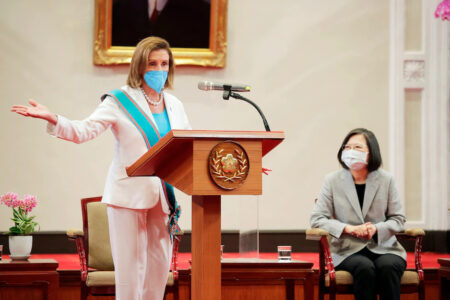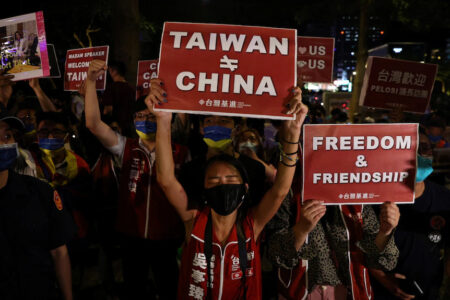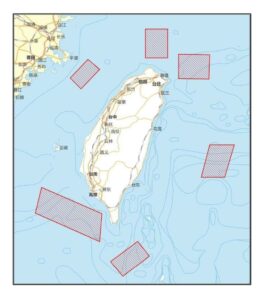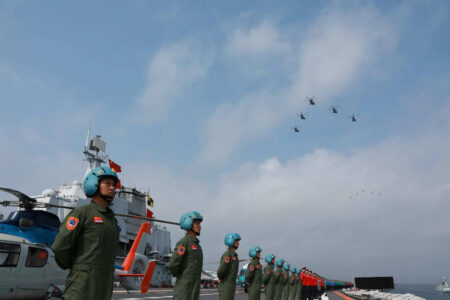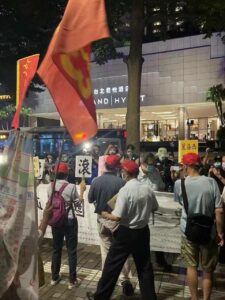U.S. House Speaker Nancy Pelosi arrived in Taiwan back on August 2, just as the media predicted. Numerous photos were posted on social media of the Speaker landing in Taiwan. Pelosi arrived in Taiwan on an unofficial visit, even the U.S. establishment refused to acknowledge responsibility for Pelosi’s trip. As expected, the speaker met with Taiwanese President Tsai Ing-wen and Taiwanese lawmakers. Chinese officials issued a strong statement expressing “firm opposition and strong condemnation.” However, many analysts fear that the real crisis will come after Pelosi leaves Taiwan.
Pelosi said her trip to Asia will focus on three important topics: global security, the economy, and governance. She said she wants to intensify dialogue between parliaments, including the U.S. and Taiwanese parliaments.
Taiwan’s Foreign Ministry also stated on Aug. 3 sincerely welcomed Pelosi to lead a delegation on a visit to Taiwan. Taiwanese for the most part supported the speaker’s visit.
The information confrontation began the moment Nancy Pelosi’s foot touched Taiwanese soil. Upon her arrival in Taipei, Speaker Pelosi published an article in The Washington post stating that Taiwan, a vibrant and strong democracy, was under threat. The Speaker also expressed her clear position: “As long as Taiwan defends itself and its freedoms, the United States supports our democratic partner.” Xinhua News Agency, the official media outlet of the Chinese Communist Party, published a statement from Wang Yi’s Foreign Ministry almost simultaneously with Pelosi’s arrival in Taiwan, condemning Pelosi’s visit with five serious statements: the Sino-US relationship seriously violates China’s sovereignty and territorial integrity, seriously undermines peace and stability in the Taiwan Strait and sends serious wrong signals to separatist forces advocating Taiwanese independence.
There are different points of view regarding Pelosi’s visit to Taiwan.
Michael Sobolik, a fellow at the U.S. Foreign Policy Council, said Pelosi’s decision to go to Taiwan was the right one, and Beijing will respond to Washington and Taipei as U.S.-Taiwan ties grow stronger by the day. He also noted that the United States should support Taiwan, symbolically and substantively. That means arming Taiwan with more weapons and building up the U.S. military in the region to stop China’s attack.
Another expert, Orville Schell, director of the Center for U.S.-China Relations in Asia, believes that Pelosi had the right to visit Taiwan and that the Chinese Communist Party has no right to set conditions for American engagement with Taiwan and the Taiwanese government.
Chinese researcher Xia Wei finds ties between Russia and Ukraine, China and Taiwan. He noted that Russian President Vladimir Putin justified his invasion of Ukraine by expanding NATO eastward; Chinese Communist Party Chairman Xi Jinping also saw China’s sovereignty threatened by Nancy Pelosi’s visit.
Many Chinese experts compared Pelosi’s visit to Taiwan to Beijing’s sharp reaction to the “1996 missile crisis in the Taiwan Strait. There have been four crises in the history of the Taiwan Strait, the last of which occurred from 1995 to 1996 and lasted more than half a year. In 1995, former Taiwanese president Lee Deng Hui received a visa and flew to the United States to give a speech at an American university. However, he was the first Taiwanese president to make an effort to improve Sino-American relations, it was his visit that triggered the 1996 Taiwan Strait crisis. In 1996, Taiwan held a presidential election, and in the run-up to that election, mainland China announced a naval exercise near the island. At the same time, China began test-firing missiles, and former Defense Minister Perry warned China that a threat to Taiwan and a further attack would have serious consequences. China remained silent at the time, but at this point, Beijing’s response is expected to be more severe. For example, Beijing has already scheduled combat drills on August 4 in six combat zones around Taiwan. Taiwan’s Ministry of National Defense has stated that China’s military exercises violate Taiwan’s territorial space, which amounts to a naval and air blockade of Taiwan and violates UN regulations. Taiwan’s Ministry of National Defense also stated that it would vigorously defend its security, repel any violation of territorial sovereignty, and enhance security based on the principle of avoiding war.
There is no exact data on whether the Fujian sailors are preparing to take Taiwan by storm, but there is a huge number of military personnel piled up in China’s southern province at the moment, which is even difficult to count, with soldiers from new military units arriving daily. Xi Jinping may indeed be preparing plans to attack Taiwan. This could be due to the economy and China’s slowing industrial growth, which has slowed. China may solve its domestic problems, such as the banking crisis, the construction crisis, and the semiconductor market at the expense of external solutions. Chinese F-35 fighter jets were already patrolling the Taiwan Strait at that time.
Taiwan’s Ministry of National Defense counted a large number of Chinese aircraft. Ministry stated that the aircraft included eight combat sorties of J-11 fighters, 10 combat sorties of J-16 fighters, one combat sortie of Air Police-500 early warning aircraft, and one combat sortie of Y-9 counter communication aircraft, and a sortie of Y-8 radio reconnaissance aircraft.
On the other hand, this strain could be “China’s last warning. Or Beijing’s actions will consist of more substantive actions, such as forcing all ships in the Gulf to pass Chinese customs and declaring a ban on flights in the Strait. For example, China has already begun to “punish” Taipei economically for its willfulness. On August 1, the Chinese Customs Administration announced in the middle of the night that it was suspending the importation of more than 100 food products from Taiwan to the mainland, among them many well-known companies, which subsequently hit Taiwan’s food industry, agriculture, and aquaculture even harder. It also hit Taiwanese farmers and fishermen.
However, not everyone in Taiwan was happy to see Speaker Pelosi. Near the Grand Hyatt Hotel, where Pelosi was staying, a group of disgruntled people gathered for her visit. A placard read: “Warmonger Nancy Pelosi: We don’t need you, we need peace.
Some U.S. officials believe that there are people in the Chinese leadership who want to use Pelosi’s trip as an excuse to change the status quo in China and Taiwan. The implication is to shift the balance of power from Taiwan to China in the region, although Beijing has never relinquished its position. The problem is also that the U.S. has violated the three Sino-U.S. communiqués and the One China principle, which are fundamental pillars of U.S.-China relations. This visit is sure to be a blow to the U.S.-China relationship.
White House National Security Council spokesman John Kirby said that China’s reaction was to be expected, and the United States “will not be intimidated by the Chinese threat,” and he expected further action in the coming days. He again insisted that U.S. policy toward China alone has not changed and urged Beijing not to use the visit to stir up a crisis. Kirby said China could apply “economic coercion” to Taiwan, adding that the impact on U.S.-China relations would depend on Beijing’s actions in the coming days and weeks.
Chinese Deputy Foreign Minister Xie Feng summoned U.S. Ambassador to China Burns and sent strong protests to the U.S. side. Earlier, Chinese Foreign Minister Wang Yi also sharply criticized the United States in an interview with reporters for “treachery in the Taiwan issue, which is despicable and can only further undermine the credibility of the United States in the PRC.”
Nancy Pelosi herself praised the leadership of Taiwanese President Tsai Ing-wen and called for closer inter-parliamentary cooperation. Pelosi also said she hoped to increase exchanges between the U.S. and Taiwan parliaments and noted that the U.S. “Microchip Act” would provide good opportunities for cooperation between the U.S. and Taiwanese chipmakers.
On behalf of Congress, President Tsai Ing-wen presented Pelosi with a medal, which Pelosi called “a symbol of the strong and enduring friendship between the United States and Taiwan.” Tsai Ing-wen said Taiwan’s core principles in the face of uncertainty include not retreating in the face of military threats and making every effort to improve Taiwan’s capabilities. She stated that Taiwan is a trusted and reliable partner of the United States. The president also cited the U.S.-Taiwan Relations Act of 1979, which she said had laid a solid foundation for a “prosperous partnership.
In the world, however, everyone reacted differently. Australian Foreign Minister Huang Yingxian stressed that all sides should “quietly stress the importance of peace and stability,” and called on all sides to do their part in reducing tensions. Russian Foreign Ministry spokeswoman Zakharova called Pelosi’s visit a provocative U.S. attempt to put pressure on China. North Korea’s Foreign Ministry criticized Pelosi’s visit to Taiwan for “reckless interference” in China’s internal affairs.
MORE ON THE TOPIC:



